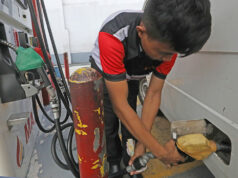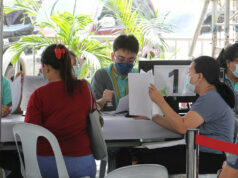Filipino youth more ready than SE Asian peers to work abroad
By Gillian M. Cortez
Reporter
MORE THAN half of Filipino youth want to go abroad to land jobs, while the Philippines had the smallest percentage of this segment saying they would like to stay in the country to work, according to an online survey covering six Association of Southeast Asian Nations (ASEAN) members which the World Economic Forum published on Aug. 16.
The 2019 survey, which covered 56,000 individuals in Indonesia, Malaysia, the Philippines, Singapore, Thailand and Vietnam aged 15- to 35-years-old and which was run last month, “examined the attitudes of ASEAN youths to jobs and skills, and the impact of technology on the future of work,” a summary of findings read.
The Forum conducted the survey online in partnership with Sea, the Singapore-based internet company that operates digital entertainment, e-commerce and digital financial service businesses known as Garena, Shopee and AirPay. Users of Shopee and Garena were invited to take part in the survey, with responses of only those aged 15- to 35-years-old considered for the report.
Survey results showed, among others, that 47.1% of Philippine respondents “would like to work in my home country”, the smallest percentage compared to 48.1% in Thailand, 51.5% in Malaysia, 54.5% in Vietnam, 60.4% in Indonesia and 65.7% in Singapore.
At the same time, 30.3% — the biggest percentage among respondents across the region — of Philippine respondents “would like to work in another ASEAN country” compared to 27% in Malaysia, 24.5% in Thailand, 23.1% in Vietnam, 22.6% in Indonesia and 12% in Singapore.
Intra-regional percentages were close in terms of wanting to work outside Southeast Asia: 21.5% in Malaysia, 22.3% in Singapore, 22.4% in Vietnam and 22.6% in the Philippines. Indonesia and Thailand were outliers with 17% and 27.4%, respectively.
Citing work by Ricardo Hausmann, professor on the Practice of Economic Development at the John F. Kennedy School of Government at Harvard University in the United States, the report said individuals seek “knowhow” — which is different from education in that it involves development of practical skills rather than theoretical knowledge — by working in foreign companies in a home country, through technology transfer brought by foreign workers or by “spending time overseas and learning new skills.”
Sought for comment, Calixto V. Chikiamco, board director at the Institute for Development and Econometric Analysis, Inc., said in a mobile phone message on Sunday that “[m]any of the jobs here are in low-level, unstable service jobs,” even as “[d]omestic growth has been strong the past five years compared to the past.”
According to the Philippine Statistics Authority, there were around 2.3 million Overseas Filipino Workers (OFW) worldwide as of 2018, with about 37.1% of them working in elementary occupations.
“Our youth may be more comfortable working abroad due to English proficiency and the OFW network [composed of friends and relatives]…” Foundation for Economic Freedom Fellow Vicente B. Paqueo said in a separate text message on Sunday.
Of the six ASEAN members covered by the survey, the Philippines also had the second-smallest percentage of respondents “who aspire to be an entrepreneur” at 18.7%, higher only than Singapore (16.9%). Indonesia topped the region in this regard with 35.5%, followed by Thailand (31.9%), Vietnam (25.7%) and Malaysia (22.9%).
In terms of acknowledgement of the need for “lifelong learning,” “the picture varies by country”: the Philippines had the highest percentage of respondents who believe their “current education and skills are already out of date,” Vietnamese had the highest proportion of those believing their skills need to be constantly updated over time, while Thai respondents were the most confident about the durability of current skills.




